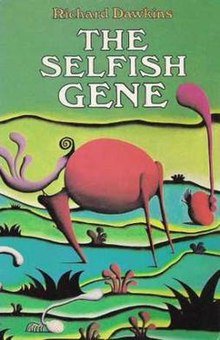The Selfish Gene

Original cover, with details from the painting The Expectant Valley by zoologist Desmond Morris
|
|
| Author | Richard Dawkins |
|---|---|
| Country | United Kingdom |
| Language | English |
| Subject | Evolutionary biology |
| Publisher | Oxford University Press |
|
Publication date
|
1976 Second edition in 1989 Third edition in 2006 |
| Media type | Print, e-book |
| Pages | 224 |
| ISBN | |
| OCLC | 2681149 |
| Followed by | The Extended Phenotype |
The Selfish Gene is a 1976 book on evolution by Richard Dawkins, in which Dawkins builds upon the principal theory of George C. Williams's Adaptation and Natural Selection (1966). Dawkins uses the term "selfish gene" as a way of expressing the gene-centred view of evolution as opposed to the views focused on the organism and the group, popularising ideas developed during the 1960s by W. D. Hamilton and others. From the gene-centred view, it follows that the more two individuals are genetically related, the more sense (at the level of the genes) it makes for them to behave selflessly with each other.
A lineage is expected to evolve to maximise its inclusive fitness—the number of copies of its genes passed on globally (rather than by a particular individual). As a result, populations will tend towards an evolutionarily stable strategy. The book also coins the term meme for a unit of human cultural evolution analogous to the gene, suggesting that such "selfish" replication may also model human culture, in a different sense. Memetics has become the subject of many studies since the publication of the book. In raising awareness of the ideas of W. D. Hamilton, as well as making its own valuable contributions to the field, the book has also stimulated research on human inclusive fitness.
In the foreword to the book's 30th-anniversary edition, Dawkins said he "can readily see that [the book's title] might give an inadequate impression of its contents" and in retrospect thinks he should have taken Tom Maschler's advice and called the book The Immortal Gene.
Dawkins builds upon George C. Williams's book Adaptation and Natural Selection, which argued that altruism is not based upon group benefit per se, but is a result of selection that occurs "at the level of the gene mediated by the phenotype" and any selection at the group level occurred only under rare circumstances. This approach was developed further during the 1960s by W. D. Hamilton and others who opposed group selection and selection aimed directly at benefit to the individual organism:
...
Wikipedia
